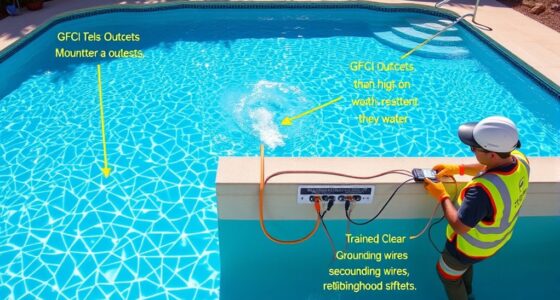To prepare guests for pool safety at parties and events, start by clearly communicating safety rules, like no running or diving in shallow areas, and emphasize the importance of supervision, especially for children. Remind everyone to stay within designated areas and avoid swimming alone. Use signage and verbal cues to reinforce these points and guarantee your staff is trained in emergency response. If you want to learn how to make your pool environment even safer, keep exploring these strategies.
Key Takeaways
- Clearly communicate pool safety rules and expectations to all guests before the event begins.
- Highlight the importance of supervision, especially for children and inexperienced swimmers.
- Ensure that at least one responsible adult is designated to monitor pool activity throughout the event.
- Educate guests on recognizing signs of distress and proper emergency response procedures.
- Improve visibility with adequate lighting and signage to prevent accidents during evening or low-light events.

Swimming pools can be fun, but they also pose significant safety risks if you’re not careful. As someone hosting a party or event, it’s essential to verify your guests are aware of safety protocols before they plunge in. One of the best ways to do this is by emphasizing the importance of lifeguard training and emergency response. If you have a professional lifeguard on duty, make sure they’re properly trained and certified. Lifeguard training teaches essential skills like active surveillance, rescue techniques, and CPR, which are indispensable in preventing accidents and responding quickly if something goes wrong. By having a trained lifeguard present, you create a safer environment, giving your guests peace of mind and reducing the risk of drownings or injuries.
Before the event starts, take a moment to educate your guests about pool safety. Remind everyone to avoid reckless behavior, such as running around the pool edge or plunging into shallow areas. Stress the importance of supervision, especially for children or inexperienced swimmers. Even strong swimmers can get into trouble if they’re exhausted or distracted. Encourage guests to stay within designated swimming zones and to avoid swimming alone. Clear communication about pool rules helps prevent misunderstandings and accidents, and it sets a safety-minded tone for the entire event.
In addition to rules, make sure everyone knows what to do in an emergency. Brief your guests on how to recognize signs of distress, such as someone struggling to stay afloat, and instruct them on the steps to take if they see someone in trouble. Highlight the importance of quick action—calling emergency response services immediately and providing first aid until professional help arrives. If you have a staff member or a designated responsible adult, confirm they’re familiar with emergency response procedures. This includes knowing how to perform CPR and rescue techniques, which are often covered in lifeguard training. Having an emergency response plan in place and communicating it clearly can make all the difference in a crisis. Additionally, understanding the contrast ratio of your pool lighting and environment can help improve visibility during evening events, reducing the risk of accidents.
Frequently Asked Questions
How Can I Ensure Guests Understand CPR Basics?
You can guarantee guests understand CPR basics by hosting a quick safety demonstration and encouraging them to participate in CPR training sessions. Provide clear, easy-to-follow instructions and hands-on practice to boost their confidence. Distribute simple CPR guides or cards as reminders. Reinforcing this knowledge before your pool party helps everyone respond effectively in emergencies, making your event safer and more enjoyable for all.
What Signs Indicate a Guest Is a Weak Swimmer?
You’ll notice signs of weakness in guests struggling to keep afloat, gasping for air, or showing inconsistent swimming ability. Watch for slow or erratic movements, frequent pauses, or clinging to pool edges. These signs of weakness suggest limited swimming ability and can signal they need extra supervision. By staying alert and recognizing these cues, you ensure everyone’s safety and can intervene before a potential emergency occurs.
Should I Provide Life Jackets for All Guests?
Yes, you should provide life jackets for all guests, especially those who are weak swimmers or uncertain in the water. Life jacket requirements help guarantee guest safety, reducing drowning risks. During your guest safety briefings, emphasize the importance of wearing life jackets when necessary. Making them readily available encourages responsible behavior and creates a safer environment, giving everyone peace of mind to enjoy the pool responsibly.
How Do I Handle Guests Who Refuse Safety Guidelines?
While it’s tempting to overlook some preferences, you must emphasize guest accountability and adhere to clear safety signage. If a guest refuses safety guidelines, kindly remind them of the importance of everyone’s safety and the pool rules. If they persist, politely but firmly encourage them to respect the guidelines or consider limiting their access. Your proactive approach helps guarantee a safe, enjoyable environment for all attendees.
What Are Fun Ways to Educate Kids About Pool Safety?
You can make pool safety fun by organizing pool safety games that encourage kids to participate actively. Use kid-friendly demonstrations, like showing how to float or use safety equipment, to keep them engaged. Incorporate colorful visuals or prizes to motivate learning. When kids enjoy the process, they’re more likely to remember safety rules, ensuring everyone stays safe and has a good time during your pool party.
Conclusion
By taking the time to educate your guests on pool safety, you’re not just preventing accidents—you’re saving lives. Imagine the peace of mind you’ll feel knowing everyone’s protected from tragedy. Don’t let a preventable incident turn your perfect party into a nightmare. Your quick efforts could mean the difference between a fun celebration and a heartbreaking disaster. So, speak up, stay vigilant, and make safety your top priority—because nothing’s more important than keeping everyone safe and sound.









